The Northern Weekly Salvo
Incorporating Slaithwaite Review of Books, Weekly Notices, Sectional Appendices, Tunnel Gazers’ Gazette and Northern Umbrella. Descendant of Teddy Ashton’s Northern Weekly and Th’Bowtun Loominary.
Published at 109 Harpers Lane Bolton BL1 6HU email: paul.salveson@myphone.coop
Publications website: www.lancashireloominary.co.uk
No. 292 April 2nd 2021 EASTER EXCURSION
Salveson’s half-nakedly political digest of railwayness, tripe and secessionist nonsense from Up North. Sometimes weekly, usually not; definitely Northern. Read by the highest and lowest officers of state, Whitmanites, weirdos, misfits, steam punks, yes women, no men, gay
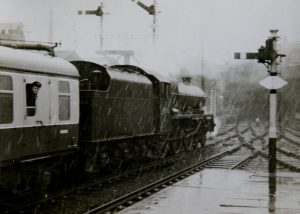
Swedenborgians, cat-spotters, discerning sybarites, bi-guys, non-aligned social democrats, pie-eaters, tripe dressers, nail artists, self-managing VIMTO drinkers, truculent Northerners, grumpy Norwegians, absurd Marxists, sleepy Hungarians, members of the clergy and the toiling masses, generally. All views expressed are my own and usually nobody else’s. Official journal of the Station Cat Improvement Network, Pacer Dining Club, Station Buffet Acceleration Council and the Campaign for a North with a capital ‘N’.
“We are far more united and have far more in common with each other than things that divide us.” – Jo Cox, maiden speech in House of Commons, June 3rd 2015
General gossips
Another long gap. What I’ve been doing? Mind’s a blank, increasingly. I know I’ve been spending a lot of time gazing at this screen which isn’t good. So a late New Year resolution was to cut down on that sort of thing unless I have to. But going back to a life of endless committee meetings doesn’t inspire either, so I’ve made a decision to cut down on ‘committee’ work, as I approach my 70th year. One of the more creative things I’ve been doing is a writing a new edition of my 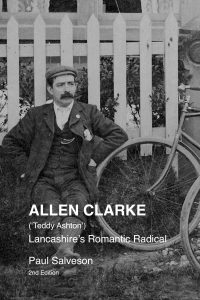 biography of Allen Clarke. The slightly revised title (thanks everyone for suggestions) will be Allen Clarke (‘Teddy Ashton’) Lancashire’s Romantic Radical. It’s with the printer now and will be ready next month. I may even be able to do a public launch – will keep you posted. See below for more details. That will be followed by a completely new edition of my ‘Whitman’ book and a similarly enlarged and enhanced Socialism with a Northern Accent, first published nearly ten years ago.
biography of Allen Clarke. The slightly revised title (thanks everyone for suggestions) will be Allen Clarke (‘Teddy Ashton’) Lancashire’s Romantic Radical. It’s with the printer now and will be ready next month. I may even be able to do a public launch – will keep you posted. See below for more details. That will be followed by a completely new edition of my ‘Whitman’ book and a similarly enlarged and enhanced Socialism with a Northern Accent, first published nearly ten years ago.
Nigel Todd – an outstanding chap and a sad loss
My good friend Nigel Todd died suddenly at his home in Newcastle-on-Tyne last week. He was 73.
I first new him at Lancaster University in the early 70s. He was active in IS (International Socialists) and I was a member of the International Marxist Group. Despite our irreconcilable differences over the class nature of the Soviet State, we hit it off, with a shared interest in working class history. We’ve stayed in touch ever since. My strongest memory is being in his living room in 1982 when he was hosting Tony Benn, who was speaking at an event in Newcastle the following day. While Benn was holding forth to a small gathring of comrades – talking  a lot of crap, I felt, on how to resolve the current NHS dispute – Nigel’s daughter Selina (named after the great Lancashire socialist and feminist Selina Cooper) was playing with a clockwork mouse which kept whizzing and wurring beneath the great man’s feet as he was holding forth. Benn completely ignored the interruptions and carried on giving us the benefit of his wisdom, which was even funnier. Selina went on to become a professor of history at Oxford; I wonder if she still has the mouse?
a lot of crap, I felt, on how to resolve the current NHS dispute – Nigel’s daughter Selina (named after the great Lancashire socialist and feminist Selina Cooper) was playing with a clockwork mouse which kept whizzing and wurring beneath the great man’s feet as he was holding forth. Benn completely ignored the interruptions and carried on giving us the benefit of his wisdom, which was even funnier. Selina went on to become a professor of history at Oxford; I wonder if she still has the mouse?
Nigel was involved in the Co-operative movement for all of his adult life. He chaired the Co-operative College’s board of trustees, and recently joined the board of the Co-operative Heritage Trust. He also chaired the Newcastle Fairtrade Partnership and was a keen advocate for co-operation, equality and peace. He dedicated his life to tackling poverty, racism and inequality – and was passionate about life-long learning.
Nigel was first elected to Newcastle City Council in 1980, and served as a councillor in Elswick and later, following boundary changes, in Wingrove Ward and more recently the Arthur’s Hill Ward. Nick Forbes, leader of Newcastle City Council, paid tribute to Nigel’s work: “He was widely known, and hugely popular, across the West End of the City; everywhere he went people would stop, say hello, and ask him for advice or help. He chaired the New Deal for Communities initiative, which brought millions of pounds of regeneration funding into the Inner West. He was active in the Labour Party, most recently chairing the city-wide Local Campaign Forum. And he was also passionate about the co-operative movement; he lived by these values and was a keen advocate of co-operative housing developments.”
Joe Fortune, general secretary of the Co-operative Party, said: “Really saddened to hear this news. Nigel was a very lovely person and a very passionate and knowledgeable co-operator. We will be much missed by his many friends across our team and our Party.”
It was characteristic of Nigel that politicians from other parties paid sincere tribute to him. Alistair Ford and Tay Pitman of Newcastle Green Party said: “Nigel was a shining beacon for kind, caring politics. He was a true community leader, representing the residents of Arthur’s Hill and Newcastle with passion and compassion, bringing people together, and fighting for fairness and peace. His tireless work for organisations like Greening Wingrove showed that he understood the importance of the local environment in our lives. He will be truly missed by people of all political colours, and we are proud to have called him a friend.”
Cllr Nick Cott, leader of the Lib Dems on Newcastle City Council, added: “We are deeply saddened and shocked to hear of the passing of Cllr Nigel Todd. …Nigel was a well respected representative of the local community who cared passionately about tackling poverty and inequality and championing lifelong learning. Members of our party speak highly of his anti-racism work.”
Tribute was also paid by the WEA, the adult educational charity, with whom Nigel worked with for many years. “We’re deeply saddened to hear of the passing of our dear friend Nigel Todd,” the organisation said in a statement. “His knowledge and passion for adult education (and the North East) and pioneering work in supporting environmental agenda are just the tip of the legacy he leaves behind. Our thoughts are with his family.”
In many ways Nigel belonged to an earlier political tradition – that ‘ethical socialist’ culture that informed the Independent Labour Party which we could do a lot worse than re-visit. For Nigel, I shall miss your Christmas cards! We shall not see his like again.
ALL CHANGE: What future for rail travel now?
I joined in with an interesting and mercifully short (don’t like long zoom meetings) stakeholder conference for TransPennine Express the other day. It was a useful and lively discussion and a few important points emerged. Research done by the rail industry is suggesting that long-term commuter travel is going to be down by about 40% of the pre-pandemic levels. Business travel will be down less, but a still thumping 25%. On the other hand, leisure travel is likely to grow by
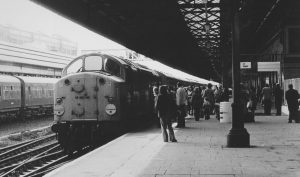
around 10%. The implications of these figures is huge, turning on its head so many assumptions that have governed thinking in rail for the last forty years or more. The main drivers of rail development have been commuting and business travel, with ‘leisure’ coming generally a poor third. The methodologies underpinning demand forecastlng have been based largely on commuting and business travel. These approaches are now discredited. We need to build an entirely new approach to forecasting demand for rail travel in which leisure travel plays a much bigger part. Another aspect of this emphasis on leisure is questions around the journey itself. The conventional wisdom within the industry has been to push for faster and faster end to end journey times. Yet leisure travellers are less bothered about super fast journeys and more concerned with avoiding changes, reliability, good information, getting seat and general comfort. So that means putting in more stops (within reason) on many services and not obsessing about knocking a few minutes of the end to end journey. And while I’m on this particular tack, what does all this mean for HS2? If it ever had any justification, it doesn’t any more.

Will it be scrapped as a result? No, it will carry on swallowing up resources that are desperately needed to support the regional and conventional InterCity and inter-regional networks. That said, I can’t see it getting beyond Crewe, and for all that Leeds might huff and puff, I don’t think it will get there either. By the time we realise what a huge white elephant HS2 is we will have squandered eye-wateringly large sums of money that could have been put to far better use. I’ll be dead and gone by then but will look down from the skies and say ‘see- told you so’.
Another England is reasonably possible
Like many northern regionalists, I love many aspects of England including its rich diversity and radical history. The North can take credit for much of what was and often still is good about England, but by no means all of it: the beauty of its landscape, its ingenuity and industry; its music, painting, architecture, science, literature and engineering. Many of these achievements were not seen as specifically ‘English’ so much as part of a Great Britain and an empire which had emerged triumphant but drastically weakened in its war against fascism.
A strong British economy with major centres of industry in the North of England, South Wales and the central belt of Scotland had compensated for the structural inequalities, including the centralisation of political power, between London and the rest of the UK. When that traditional industrial base collapsed, from the 1980s, it marked the
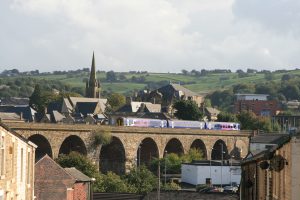
beginning of the end for ‘Great Britain’, at least as we know it. The end of Britain, whether we mourn it or not, does offer real opportunities, with a very different ‘England’ working positively with Scotland, Wales and Ireland (north and south, but re-unification is beginning to look like a serious possibility) as well as Europe.
We must not succumb to an England of the stereotypes – of the village green and the quaint church with the flag of St George flying high. That awful term ‘quintessentially English’ has no space for the North, nor for urban, multi-cultural London and Birmingham. And a I wish they’d stop patronisingly referring, in lower case, to ‘the north’, that land of the supposed ‘red wall’ constituencies, which actually have changed hands throughout much of the last century.
We need to create a new England which is re-balanced, with the historic exploitation of its regions reversed. The germ of a decentralised, progressive England is already there and it has been highlighted – perhaps clumsily – by the proponents of ‘progressive Englishness’. Another England is possible, but it’s an England of the regions.
What could an ‘England of the regions’ mean in practice? The alternative to a unitary, centralised English Parliament should be a de-centralised England which reflects the regional diversity of the country and sits comfortably with its neighbours. Could ‘English regionalism’ be just as reactionary as English nationalism? Experience from elsewhere in Europe, suggests not. Regionalism tends to be inclusive and socially progressive, with no ‘empire’ baggage. When I was campaigning for the small regionalist party Yorkshire First (now The Yorkshire Party) I found that regional identities were predictably strong in white working class areas but also in working class South Asian communities. Regional identity can be a very unifying force.
And it’s ‘identity’ which is key. We need to re-think the ‘regional’ map of England and not take the post-war regional boundaries (through the standard planning regional structure) as given. People’s identities are as important as what works economically. Some English regions form an obvious shape – Yorkshire and its neighbour the North-East being perhaps two of the most obvious. Others, including the North-West, don’t. We should be careful of drawing arbitrary distinctions which ignore people’s strong sense of identity – which is one of the biggest cards that regionalism has to play. And there’s no doubt that ‘identity’ is a tricky thing, with people having identities that are national, regional, local and neighbourhood; as well as ‘European’ and wider.
Within ‘The North’ regional identity is often strongest at a lower, more regional, level than ‘The North’. As Ian Martin has argued: “…it is important to recognise that for many people in Yorkshire, their primary sense of identity is not Northern or English, but Yorkshire. English parliament supporters often point to the 2011 census and use it to suggest increasing numbers of people in Yorkshire feel primarily English. In reality however, the census doesn’t give people in Yorkshire a fair opportunity to identify with identities other than ‘English’ or ‘British’. When the option to identify as Yorkshire is given, as described by Pete Woodcock, the overwhelming majority identified as ‘Yorkshire’ with only a smaller proportion identifying as ‘English’ as well. The most common identity was ‘more Yorkshire than English’ and around 15% of residents surveyed rejected the idea of English identity completely.”
My gut feeling is that a similar response would come from Lancashire (including some of those parts which are now in Greater Manchester, Merseyside and Cumbria), if people were asked. The mayor of ‘North of the Tyne’ (a strange concept), Jamie Driscoll, captured a sense of regional versus ‘English’ identity in the North-east when he said recently “Up here, we talk about defending the North-east. Bringing up the union – well, that’s a reminder of the Establishment down south, isn’t it?”
So perhaps a revived and enlarged ‘Lancashire’ alongside Merseyside and Cumbria would be an option instead of a ‘North-West’ region which few people identify with. The obvious solution is to ask people, using citizens’ assemblies and other grassroots participative approaches rather than the blunt instrument of a referendum which would easily be swayed by the media, as we saw in the North-East in 2004 (still held up by centralists as a reason why ‘regional democracy’ is not wanted). If any of this is of interest, why not sign up to membership of the Hannah Mitchell Foundation? It’s free – we are currently updating the website but here it is: www.hannah-mitchell.org.uk
NIP in the bud
An interesting new feature on the political landscape is the Northern Independence Party (NIP). It was formed in October 2020 and has skilfully used social media to gain a lot of interest, not least among the young folk. It is politics with a Northern accent and a sense of humour (it has a whippet as its mascot). It is fielding former Colne Valley Labour MP Thelma Walker as its candidate in the Hartlepool by-election and will be up against the North-East Party, as wella s the mainstream parties and oddballs. More on NIP and prospects for a ‘Northumbrian nationalism’ in the next Salvo, but see www.freethenorth.co.uk
Around Hoghton Bottoms and Withnell Fold
The focus of our local walks has shifted to the north-east slightly. We haven’t quite exhausted the area around Coppull and Standish but probably done most of it, including discovering remains of the colliery branch from Coppull to Welsh Whittle pit, once the stamping ground of preserved 11456, the Lancashire and Yorkshire Rly saddletank. The area for our wanderings now is around Hoghton and Withnell. The
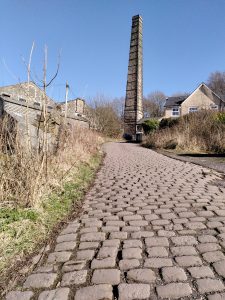
Leeds – Liverpool Canal runs through it making for a nice ‘outward’ walk and through fields and woodland to return. Withnell Fold is a good place to start, a former mill village that is hidden away, off the Chorley – Blackburn road. The old paper mill is still largely intact and used for small businesses. The fine company houses are well preserved and there seems to be a very active community based around the cricket ground and its social club. The canal is just to the north of the village – we walked in Blackburn direction as far as the bridge that takes you to Ollerton Fold, then along paths back to our starting point. A subsequent walk was from Hoghton, starting from the railway bridge at the ‘summit’ of the line and a good place to photograph steam specials when they re-commence (soon). The path down to Hoghton Bottoms is attractive and the view of the railway viaduct from the river is stunning. The River Darwen bursts through rocks in a scene that is quite stunning. The path takes you under the viaduct and along the river bank, ending up near Feniscowles. If you cross the main road and walk by the remains of the former paper mill (there was a lot of paper making round here) you get onto the canal. Head back towards Wheelton and pick up a path to Riley Green. Crossing fields, you’ll reach Hoghton, passing the fine village pub, The Royal Oak, which will shortly re-open for outside drinks and meals. Can’t wait.
Allen Clarke – remembering Teddy Ashton
He was friends with Keir Hardie, corresponded with Tolstoy and met Thomas Hardy. He was loved by tens of thousands of Lancashire mill workers and had a bewildering output of novels, sketches in Lancashire dialect and works of philosophy. Yet today Allen Clarke is little known,
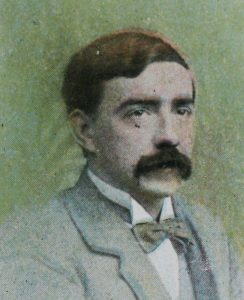
even in his native county. My book on him – Lancashire’s Romantic Radical – the life and writings of Allen Clarke/Teddy Ashton was published in 200,. For various reasons it wasn’t an ideal time to launch a book but I have managed to shift 500 copies. It’s time for a new edition. Here is a bit about him…
I first discovered Allen Clarke when I was a student at Lancaster in the 1970s. Mooching about in the university library I came across a collection of dialect sketches set in my home town, Bolton. They were funny, perceptive and politically incisive. The author was ‘Teddy Ashton’ whom, it turned out, was a writer called Allen Clarke. It began a close life-long friendship, though we have yet to meet. Clarke was born in Bolton on February 27th 1863. He became one of the North’s most popular dialect writers, following in the footsteps of Edwin Waugh, Ben Brierley and Samuel Laycock, a generation later. He was at his peak between the mid-1890s and late 1920s, with thousands of devoted readers amongst the mill workers of Lancashire and Yorkshire. He was best known by his ‘Teddy Ashton’ pen-name which he used for his ‘Tum Fowt Sketches’ set in ‘Tum Fowt’ (or ‘Tonge Fold’) just outside Bolton. He was, in the broadest sense, a ‘libertarian socialist’. 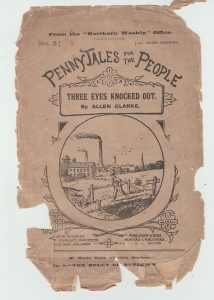 He was friends with Tolstoy and tried to set up a co-operative community near Blackpool in 1903-5. His writings did much to turn public opinion against child labour. In the 1890s the ‘half-time’ system was still in general operation across Lancashire, with working class kids going to work in the mill at 6 a.m. then school in the afternoon.
He was friends with Tolstoy and tried to set up a co-operative community near Blackpool in 1903-5. His writings did much to turn public opinion against child labour. In the 1890s the ‘half-time’ system was still in general operation across Lancashire, with working class kids going to work in the mill at 6 a.m. then school in the afternoon.
He had complex spiritual interests – he helped to popularise eastern philosophy in his newspapers and in books such as What is Man? and The Meaning of Life. He was a spiritualist; his book The Eternal Question is probably the best statement of his religious beliefs. Running through all his work is his passion for Lancashire, and cycling.
The new edition of my book is a) significantly enlarged with a new chapter on his railway writings b) properly referenced and c) has an index. Maybe there’s a d) as well – hopefully most of the typos have been removed. The book is at the printers – Minerva Press, Bolton. The same firm which printed Moorlands, Memories and Reflections last year, so they’ll do a good job. It should be ready in May and I’m hoping to keep the price around £15. There will be a pre-publication offer for Salvo readers.
Looking back on our history
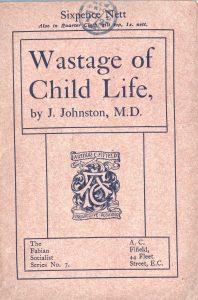
My most recent piece in The Bolton News’ ‘Looking Back’ pages was on Dr John Johnston – GP and railway doctor, Whitmanite, poet, cyclist and supporter of Bolton Labour Church. A close friend of Edward Carpenter’s and advocate of ‘beauty in civic life’. The full article is here: https://www.theboltonnews.co.uk/news/19191649.boltons-illustrious-doctor-johnston—man-many-talents/
The previous feature celebrated four exceptional women – Alice Foley, Sarah Reddish, Susan Isaacs and Alice Collinge: https://www.theboltonnews.co.uk/news/19154232.celebrating-legacy-four-pioneering-women-bolton/
Illuminating books from the Lancashire Loominary
I mentioned other books in the pipeline, so here goes. After Allen Clarke I’m bringing out a new edition of my Walt Whitman (With Walt Whitman in Bolton: spirituality, sex and socialism in a Northern Mill-town) book which includes a new section on ‘Walt Whitman and Socialism in the North of England’. It effectively doubles the size of the original which despite having gone through four editions hasn’t changed much since I did the first one in 1984. This will be a significant change and hopefully improvement. Again, it’s well referenced and has an index, keeps most of the illustrations and adds a lot of new material. It 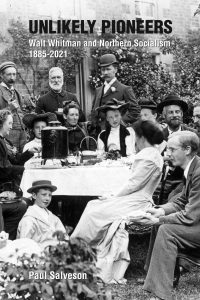 includes a piece by Stuart Murray on the more recent history of the Bolton-Whitman connection, mostly the annual Whitman Walk. The new book will be called Unlikely Pioneers: Walt Whitman and Northern Socialism 1885-2021. I’m aiming to have it out for Whitman Day – May 31st. After that, I’m bringing out a new edition of Socialism with a Northern Accent. The original was published in 2012 and the world has moved on. The early history of socialism in the North of England is all still valid but I’ve added new material and brought the story up to date. There will be a lot more on politics in the North today and prospects for a radical Northern political revival that can challenge the Tories. That should be out in September. I’m thinking about a completely new book which incorporates bits of Northern Rail Heritage (2009) and Railpolitik (2011) into a new production called, provisionally: Northern Railways: Trains as if people mattered. Alongside all those, I am toying with a new novel. More on that soon.
includes a piece by Stuart Murray on the more recent history of the Bolton-Whitman connection, mostly the annual Whitman Walk. The new book will be called Unlikely Pioneers: Walt Whitman and Northern Socialism 1885-2021. I’m aiming to have it out for Whitman Day – May 31st. After that, I’m bringing out a new edition of Socialism with a Northern Accent. The original was published in 2012 and the world has moved on. The early history of socialism in the North of England is all still valid but I’ve added new material and brought the story up to date. There will be a lot more on politics in the North today and prospects for a radical Northern political revival that can challenge the Tories. That should be out in September. I’m thinking about a completely new book which incorporates bits of Northern Rail Heritage (2009) and Railpolitik (2011) into a new production called, provisionally: Northern Railways: Trains as if people mattered. Alongside all those, I am toying with a new novel. More on that soon.
Books in print or kindle
The main sales items at the moment are my book celebrating the West 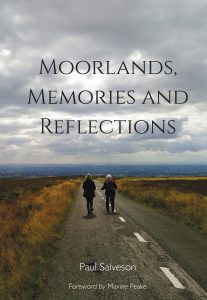 Pennine Moors – Moorlands, Memories and Reflections and a sudden rush of interest in my novel (set in Horwich Loco Works) The Works. This could be related to the special offer of £6 while stocks last. The ‘Bolton – Lancashire’ face mask is now sold out and has raised about £500 for local charities. I’m also doing a half-price offer on the current With Walt Whitman in Bolton, for £5.
Pennine Moors – Moorlands, Memories and Reflections and a sudden rush of interest in my novel (set in Horwich Loco Works) The Works. This could be related to the special offer of £6 while stocks last. The ‘Bolton – Lancashire’ face mask is now sold out and has raised about £500 for local charities. I’m also doing a half-price offer on the current With Walt Whitman in Bolton, for £5.
I’m in the process of putting books onto kindle (well, Simon is on my behalf, far too complicated for me). The life and work of Allen Clarke/Teddy Ashton – Lancashire’s Romantic Radical (see above) – will be going on the kindle list, as well as With Walt Whitman in Bolton – which may help sales in America.
Full details of all publications are on my website here (or see summary below): www.lancashireloominary.co.uk or email me for details at info@lancashireloominary.co.uk
Second-Hand Department
The Lancashire Loominary Secondhand Bookshop has stirred a bit of interest. There’s still some quite good stuff there and I’ve added a few things recently – you can view it at http://lancashireloominary.co.uk/index.html/second-hand-books . I’ve added a few more things to it and I’m happy to consider swops for interesting books on Lancashire, politics, railways etc.
My photo gallery – an emphasis on steam (but not completely)
I’ve been making some changes to my website/s…I’m keeping www.lancashireloominary.co.uk for all publications, including The Salvo. However, www.paulsalveson.org.uk has been re-born as Paul Salveson Photography: places, trains and factories or summat like that.
There are several pages dealing with different aspects of my photography: BR Steam, Continental Steam, The Modern Railway, Industrial Steam, Northern Rural Landscapes, Mills and Mines, and Strikes, Riots and Demonstrations. This is my current favourite: Industrial Railways UK 1966 – 1980 – Paul Salveson Photography
Good places to buy my books and other things
As lockdown starts to ease, more shops will be opening in the next few weeks which sell my books. These include Carnforth Bookshop, Wrights’ Reads in Horwich, Pendle Heritage Centre in Barrowford and Kelsall’s in Littleborough. Please support your local bookshops, it’s vital they survive.
A great feature of any walk up Rivington Pike is the Pike Snack Shack on George’s Lane – a long way up, the last place before you get on the track to the summit. They do coffee, pies, sandwiches and cakes for takeaway and you can sit amidst the heather and savour the view across the West Lancashire Plain. You can also buy copies of Moorlands, Memories and Reflections. Another popular addition to my list of retail
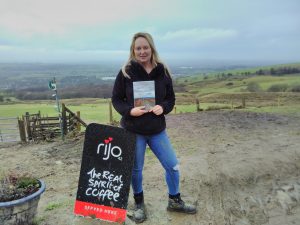
outlets is Bunbury’s real ale shop at 397 Chorley Old Road, Bolton. The bar side of the business is currently shut but they are open for takeaway. I can recommend their oatmeal stout and some superb German lager. Another slightly unconventional outlet is A Small Good Thing, on Church Road. This is a great little shop mainly selling organic fruit and veg and a range of ‘small good things’. Fletcher’s Newsagents on Markland Hill Bolton are stockists.
Justicia Fair Trade Shop on Knowsley Street, Bolton, is handy for the town centre and has a full set of my books available (and some great gifts from around the world, ethically sourced). The shop is open and they’re planning a special event on Saturday April 17th with more stock on display and other groups having stalls (including me!).
Horwich Heritage Centre stock some of my books. They will be opening the shop in two weeks – check website for details: www.horwichheritage.co.uk. They have a great selection of railway memorabilia.
Winter Hill 125 – this September, join us for a walk o’er Winter Hill
Plans to celebrate the 125th anniversary of the 1896 Winter Hill ‘mass trespass’ continue to evolve with strong interest from The Woodland Trust, local unions, The Ramblers and many more groups and individuals. The celebration will take place on Sunday September 5th 2021 – get it in your diary now! My book on the mass trespass is available price £5 (plus postage if not local) – see below. It is hoped to have some major events this year, circumstances permitting. More details to follow. The best way of keeping updated is to join the Winter Hill 125 facebook page. The zoom conference on march 12th went very well – though we were over-subscribed with 170 people registered. We could only allow in 100! However, it is now available on youtube, take a look: https://www.youtube.com/watch?v=OdDUgiWz1lg
Small Salvoes
- Radio 3’s week of ‘music from Manchester’ had some really interesting material. The Manchester Collective performed a marvellous piece by Wojciech Kilar called ‘Orawa’ which I’m going to get as a CD.
- Civic Revival held a very good zoom conference last Sunday on ‘Empowering Communities’ with stimulating contributions from a range of speakers including Cllr Matthew Brown, leader of Preston Council. It can now be viewed online: https://www.civic-revival.org.uk/video-of-empowering-our-communities/
- Bolton Food and Drink festival will happen this year, over the August Bank Holiday. Bolton Station will hold its ‘Mela’ on the same weekend with a wide range of food and music.
- Poetry from the Platform is selling well and you can buy it via pay pal on the CRP website. Details here: https://www.boltoncommunityrail.org.uk/2021/02/26/poetry-platform-for-boltons-creative-community/#more-307
- M.D. Smith has just brought out Horwich Locomotive Works Re-Visited – it’s available price £20 from Horwich Heritage Centre.
- The former Horwich Loco Works site has largely been cleared for housing development. However, the former offices have survived and the Millwrights’ and Pattern Shop is being converted into a food and drinks hall, ‘well-being centre’ with heritage displays
…………………………………………
Special Traffic Notices: Coming Events
Nothing specific as yet but a programme of steam specials starts in May including trains from Carnforth via Preston and Blackburn to Carlisle and the east coast.
………………………………….
The Salvo Publications List – see www.lancashireloominary.co.uk
The following are all available from The Salvo Publishing HQ, here at 109 Harpers Lane, Bolton BL1 6HU. Cheques should be made out to ‘Paul Salveson’ though you can send cash if you like but don’t expect any change. Bottles of whisky, old bound volumes of Railway Magazine, number-plates etc. by negotiation. If you are local you are welcome to call round and pick books up on the doorstep, or the Bolton Bicycling Bookshop can deliver to yours.
Moorlands, Memories and Reflections (2020) A hundred years ago Lancashire writer Allen Clarke published a forgotten masterpiece – Moorlands and Memories, sub-titled ‘rambles and rides in the fair places of Steam-Engine Land’. Clarke’s biographer, Professor Paul Salveson, has published a new book celebrating Clarke’s original and bringing the story of Lancashire’s moorland heritage up to date. Maxine Peake, in her foreword to Paul’s book, says “Hill walking, cycling, literature, philosophy, protest and The North…. these are a few of my favourite things.” She adds “Paul Salveson’s new book on Allen Clarke is irresistible.” Price £20 – see the website for details of how to buy: http://lancashireloominary.co.uk/index.html/order-form
The Works (2020). My first novel , set in Horwich and Bolton in the 1970s and 1980s but bringing the story up to the present and beyond. Much of the action takes place in Horwich Loco Works and the campaign to save it from closure. In real life, it closed down in 1983. In the novel, after a workers’ occupation it is run as a co-operative, building both steam for heritage railways and modern eco-friendly trains for the world market. Price £6 (special offer) . Also on Kindle £4.99.
Will Yo’ Come O’ Sunday Mornin’? The Winter Hill trespass of 1896 (1996). Quite a few copies have re-surfaced and are available price £5 – with all proceeds going to Bolton Socialist Club, which played the main part in organising the original demonstrations in 1896. This was Britain’s biggest-ever rights of way battle with a series of demonstrations which peaked at 12,000 one Sunday afternoon in September 1896.
Lancashire’s Romantic Radical – the life and writings of Allen Clarke/Teddy Ashton‘ (2009). The story of Lancashire’s errant genius – cyclist, philosopher, unsuccessful politician, amazingly popular dialect writer. This book outlines the life and writings of one of Lancashire’s most prolific – and interesting – writers. Allen Clarke (1863-1935) was the son of mill workers and began work in the mill himself at the age of 11. Currently out of print but new and enlarged edition out in May. There will be a pre-publication offer.
With Walt Whitman in Bolton – Lancashire’s Links to Walt Whitman This charts the remarkable story of Bolton’s long-lasting links to America’s great poet. Bolton’s links with the great American poet Walt Whitman make up one of the most fascinating footnotes in literary history. From the 1880s a small group of Boltonians began a correspondence with Whitman and two (John Johnston and J W Wallace) visited the poet in America. Special offer to end of April £5 plus postage if not local. New and extended edition under preparation – should be out late May, in time for the annual ‘Whitman Day’
The Settle-Carlisle Railway (2019) published by Crowood and available in most bookshops price £24. It’s a general history of the railway, bringing it up to date. It includes a chapter on the author’s time as a goods guard on the line, when he was based at Blackburn in the 1970s. The book includes a guide to the line, from Leeds to Carlisle. Some previously-unused sources helped to give the book a stronger ‘social’ dimension, including the columns of the LMS staff magazine in the 1920s. ISBN 978-1-78500-637-1
You can get a better idea from going to my website: http://www.lancashireloominary.co.uk
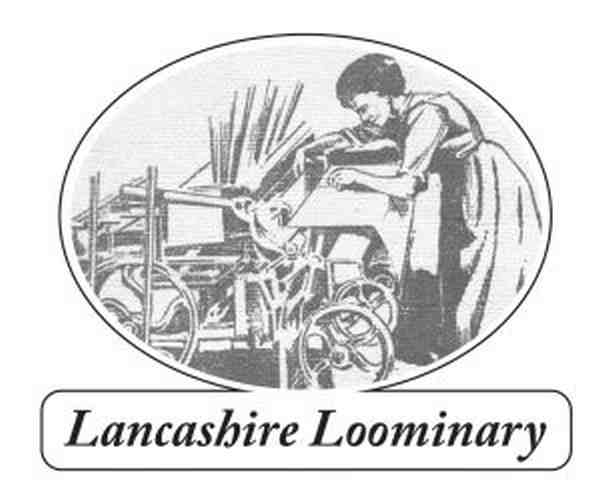
6 replies on “Weekly Salvo 292”
Paul, I’ve been busy on the literary front as well. In addition to my regular flow of Pen & Sword Locomotive Portfolio series, I’ve self-published a novel on Judas ‘The Reluctant Traitor’ and ten short stories from the railway steam age called ‘Steamy Stories’ which might be of interest to your readers . Both will be on Amazon at £7.99 for the paperback and £5.99 Kindle with all profits to Railway Children
Great to see the Salvo in unsinkable good form. I am mourning the final demise of the Scottish Review of Books which I helped launch a couple of decades ago. By contrast the Scottish Railway Preservation Society – I was a founder-member in 1962 – goes from strength to strength at its Bo’ness HQ, as does my friend Dr Iain Frew’s regular review of world railways in the Electric Railway Society Journal. Though where to put the SRPS’s current guest – the experimental hydrogen railcar recently delivered by road trailer?
Hello Chris, hope you’re well. You could write an occasional piece for the Bolton Review of Books…
Vote NIP in Hartlepool & help let the Tories in! Is that what’s wanted? Progressive forces have got to stop fragmenting.
Always the call of stick in the mud Labour…and the Liberals before then when Labour was emerging as a progressive force. Labour has shown little interest in places like Hartlepool, and is currently more worried about Scotland (though that particular horse has bolted). If NIP and NEP get good votes that will show Labour that Northern devolution needs to be taken seriously. If neither was standing I suspect they would still lose the seat to the Tories. And…if Labour had embraced a fair voting system when they were in power the ‘splitting the vote’ issue would be less of a problem
Disaappointed to see that your ‘North West’ is Lancashire with a place for Cumbria in the scheme of things but with Cheshire excluded. Cheshire is not all expensive footballers’ mansions and memories of Cranford. In fact most of its towns are as industrial by nature as those of Lancashire – think of Macclesfield and Congleton (textiles), Sandbach (Fodens and ERF), Crewe (railways), Middlewich, Northwich and Runcorn (chemicals) and Ellesmere Port (petrochemicals). Only Chester, Knutsford and Nantwich fit the image of Cheshire as a bit of the Home Counties that has strayed north.
Having got that off my chest… I agree that regional government is needed to counteract the pull of London and give the rest of the country a voice. North West England has more people and abigger economy than Scotland or Wales (or Denmark) yet has less of a voice nationally.
The North West did get its act together as a region in the 1990s when all the main constituents (Lancashire, Cheshire, Manchester and Liverpool) pulled together with the regional business community. But the region had no tax base of its own and came to rely on central government funding in the 2000s. So it collapsed when ‘Austerity’ struck in 2010 and that money was abruptly withdrawn. For the voice of this whole region west of the Pennines to revive requires all its constituent parts to be involved and committed.